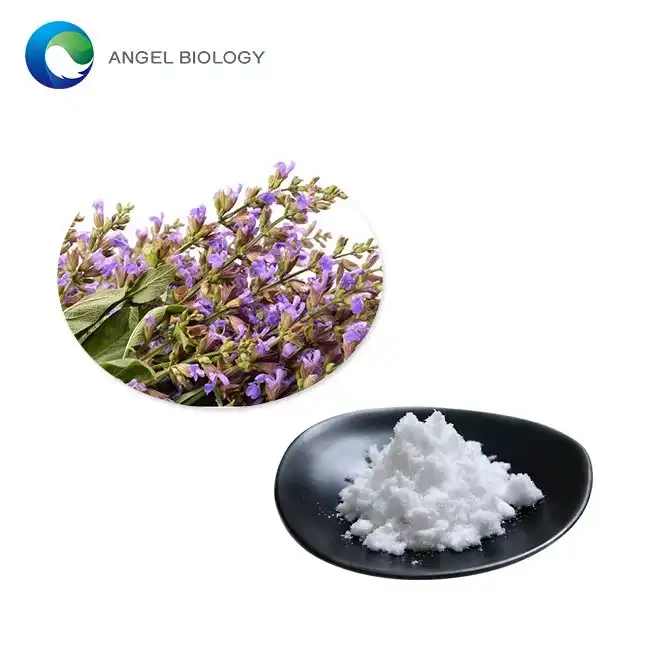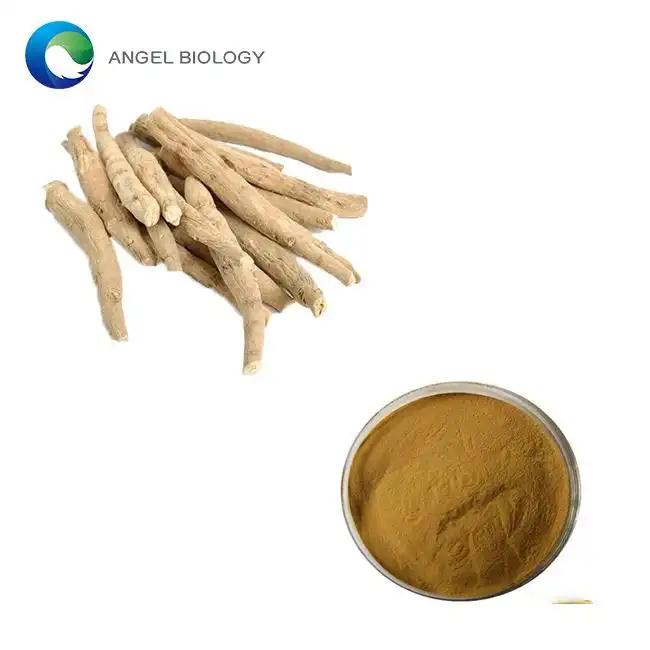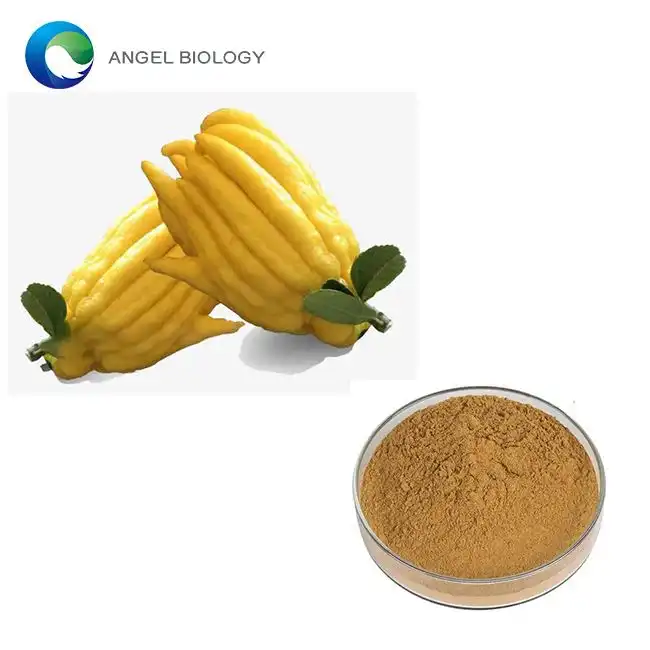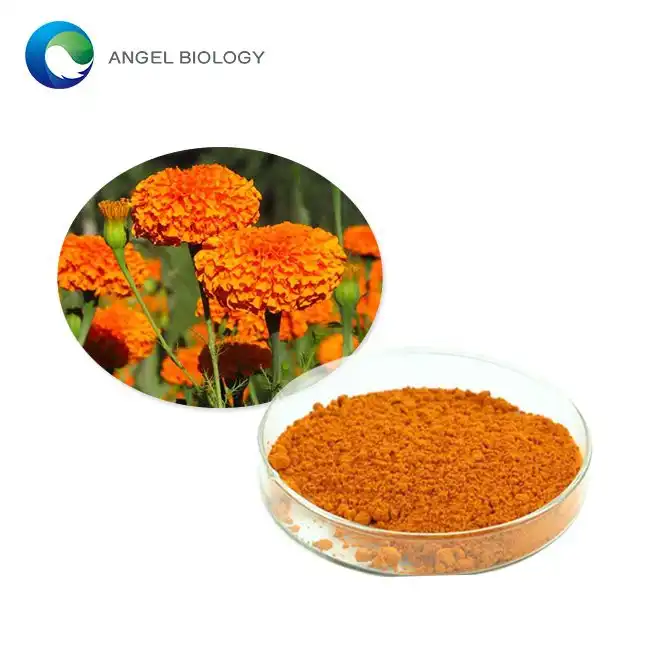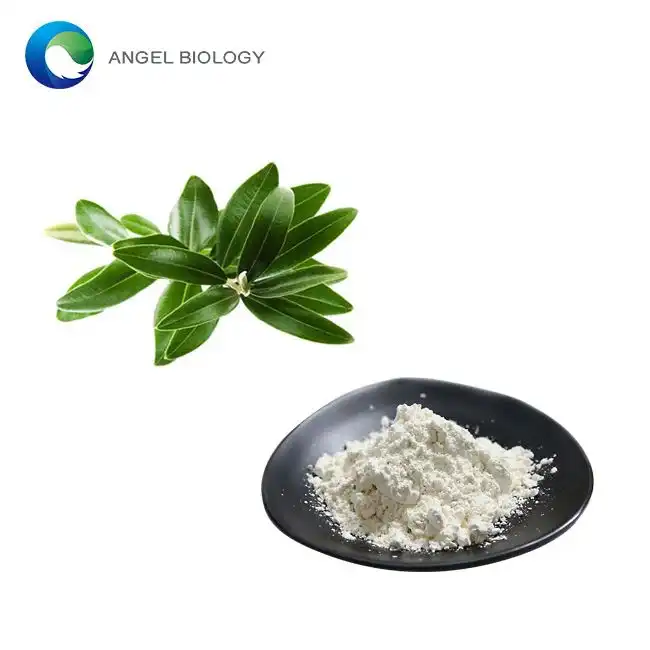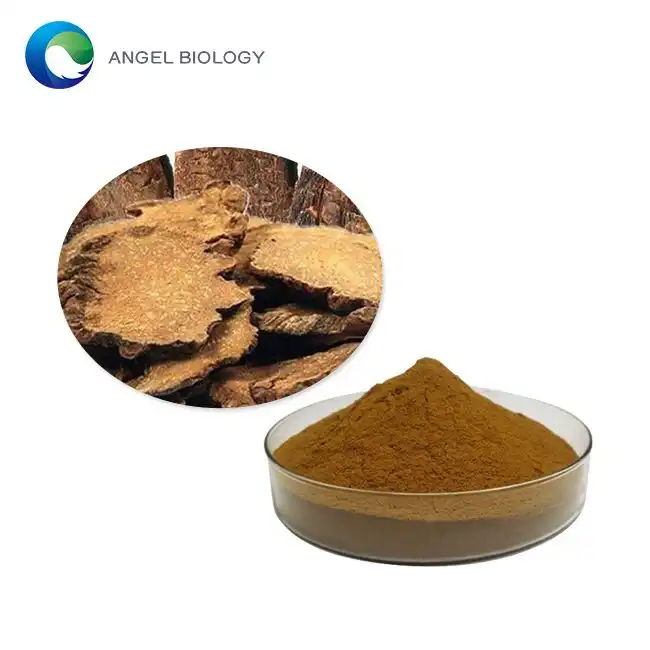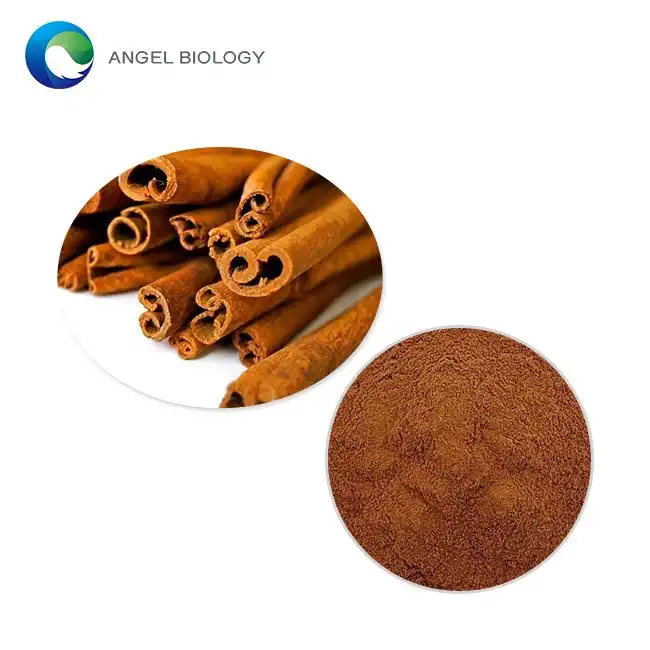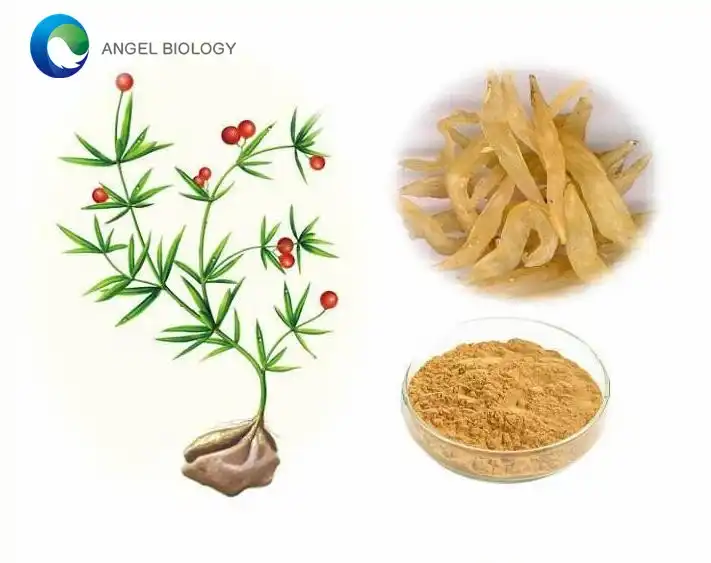Can Apocynum Venetum Extract Help with Inflammation?
Inflammation has become a critical health concern in modern society, with researchers continuously seeking natural and effective solutions to manage chronic inflammatory processes. Apocynum Venetum, a lesser-known botanical extract, has recently emerged as a promising candidate in the realm of natural anti-inflammatory interventions. This comprehensive exploration delves into the potential mechanisms, scientific evidence, and therapeutic implications of Apocynum Venetum Extract in addressing inflammatory conditions.
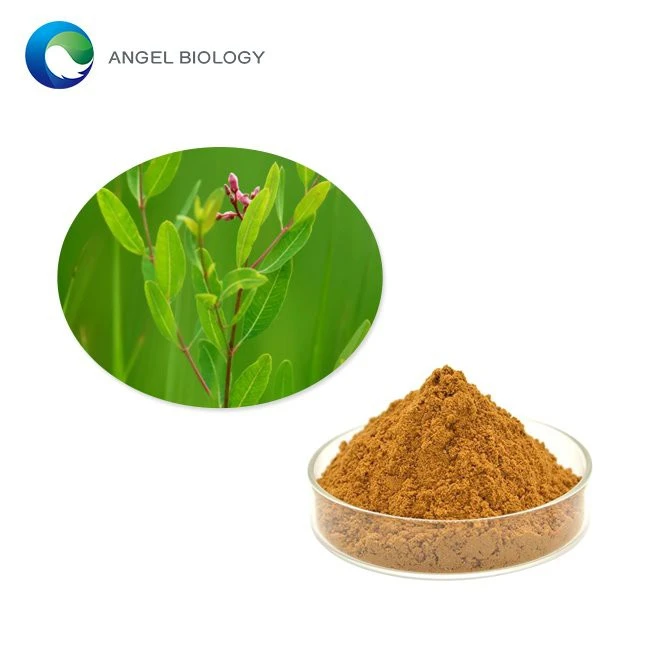
Apocynum Venetum Extract
Other names: Apocynum herbs extract, Dogbane extract
Plant source: Apocynum venetum L.[Trachomitum venetum(L.)Woodson: Apocynum lancifolicum Russan.]
Specification: 10:1, etc.
Part used: Leaf
Appearance: Brown fine powder
Extraction method: Water extraction
Test method: TLC
Stability: Stable
Storage: Cool and dry place
Shelf life: 2 years
Certifications: ISO9001, Kosher,Halal, FDA, IFEAT
Packing Size: 25kg/drum
Delivery Terms: EXW, FOB, CIP, CIF, DAP
Transportation: Courier, Air, Ocean
Payment Terms: T/T preferred
Delivery: Ready stock, Prompt and Secure Shipment
Free Sample: Available
OEM/ODM: Available
MOQ: 25kg
Discount for large orders
Not for Private Person Sale
Send Inquiry
Is Apocynum Venetum Extract a Natural Solution for Chronic Inflammation?
Chronic inflammation represents a complex physiological response that underlies numerous health challenges, including cardiovascular diseases, metabolic disorders, and autoimmune conditions. Traditional medical approaches often rely on pharmaceutical interventions, which can carry significant side effects and long-term health implications. Apocynum Venetum, a perennial herbaceous plant native to various regions of Asia, presents an intriguing alternative for individuals seeking natural inflammatory management strategies.
The botanical's historical use in traditional medicine systems provides a foundational understanding of its potential therapeutic properties. Indigenous medical practices in regions like China and Korea have long recognized Apocynum Venetum for its potential health-promoting characteristics. Modern scientific investigations have begun to unravel the complex biochemical composition of this remarkable plant, revealing a rich profile of bioactive compounds that demonstrate significant promise in modulating inflammatory responses.
Phytochemical analyses have identified multiple compounds within Apocynum Venetum that contribute to its potential anti-inflammatory efficacy. Flavonoids, phenolic acids, and terpenoids represent key molecular components that interact with inflammatory pathways at cellular and systemic levels. These compounds exhibit remarkable potential in neutralizing reactive oxygen species, inhibiting pro-inflammatory enzyme activities, and regulating cellular signaling mechanisms associated with inflammatory processes.
Epidemiological studies and ethnobotanical research suggest that populations traditionally consuming Apocynum Venetum-based preparations demonstrate lower incidences of chronic inflammatory conditions. This observation provides compelling preliminary evidence for the extract's potential protective and therapeutic mechanisms. Researchers have hypothesized that the plant's unique molecular composition enables comprehensive inflammatory modulation through multiple physiological pathways.
Contemporary scientific methodologies have enabled more precise investigations into the extract's mechanism of action. Advanced techniques like molecular docking, cellular assays, and comprehensive metabolomic analyses have provided deeper insights into how Apocynum Venetum interacts with complex inflammatory signaling networks. These studies reveal the extract's multifaceted approach to managing inflammatory responses, suggesting potential applications across various health domains.

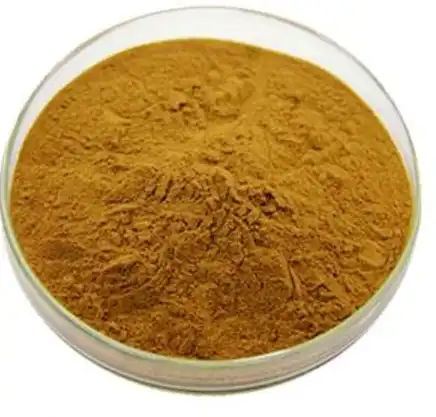
How Does Apocynum Venetum Extract Potentially Modulate Inflammatory Responses?
The molecular mechanisms underlying Apocynum Venetum Extract's anti-inflammatory potential represent a fascinating area of scientific exploration. Sophisticated research has unveiled intricate pathways through which this botanical intervention interacts with the body's inflammatory signaling systems, offering a nuanced approach to managing chronic inflammatory conditions.
At the cellular level, Apocynum Venetum Extract demonstrates remarkable capabilities in regulating key inflammatory mediators. Nuclear factor-kappa B (NF-κB), a critical transcription factor responsible for orchestrating inflammatory responses, appears to be significantly modulated by the extract's bioactive compounds. By inhibiting NF-κB activation, the extract potentially suppresses the production of pro-inflammatory cytokines such as tumor necrosis factor-alpha (TNF-α), interleukin-1β (IL-1β), and interleukin-6 (IL-6).
Oxidative stress represents another crucial dimension of inflammatory processes that Apocynum Venetum Extract addresses comprehensively. The extract's rich antioxidant profile, characterized by potent flavonoids and phenolic compounds, neutralizes harmful free radicals and reduces oxidative damage. This antioxidant action helps mitigate chronic inflammatory conditions by preventing cellular deterioration and supporting overall tissue health.
Enzyme inhibition provides another significant mechanism through which Apocynum Venetum Extract potentially mitigates inflammatory responses. Cyclooxygenase (COX) and lipoxygenase (LOX) enzymes, primary contributors to inflammatory cascade reactions, demonstrate reduced activity in the presence of the extract's bioactive molecules. By modulating these enzymatic pathways, the extract offers a natural alternative to conventional non-steroidal anti-inflammatory drugs (NSAIDs).
Immunomodulatory effects constitute another remarkable aspect of Apocynum Venetum Extract's therapeutic potential. The extract appears to regulate immune cell functions, promoting a balanced inflammatory response rather than complete suppression. This nuanced approach suggests potential applications in managing autoimmune and chronic inflammatory conditions where immune system dysregulation plays a significant role.
Emerging research has also highlighted the extract's potential in supporting mitochondrial function and cellular energy metabolism. By protecting mitochondrial integrity and reducing inflammatory-induced metabolic disruptions, Apocynum Venetum Extract may offer comprehensive support for cellular health and resilience against chronic inflammatory challenges.
Can Apocynum Venetum Extract Provide Relief for Inflammatory Conditions?
The potential therapeutic applications of Apocynum Venetum Extract extend across multiple inflammatory-associated health conditions, presenting a promising avenue for natural intervention strategies. Clinical and preclinical research has explored its efficacy in addressing various inflammatory manifestations, revealing encouraging preliminary results that warrant further comprehensive investigation.
Cardiovascular health represents a critical domain where Apocynum Venetum Extract demonstrates significant potential. Chronic inflammation plays a pivotal role in cardiovascular disease progression, contributing to endothelial dysfunction, atherosclerosis, and systemic inflammatory responses. Preliminary studies suggest that the extract's anti-inflammatory properties may help mitigate cardiovascular risk factors by reducing inflammatory markers and supporting vascular health.
Metabolic disorders, including diabetes and obesity, present another promising area for Apocynum Venetum Extract's therapeutic intervention. Chronic low-grade inflammation is closely associated with metabolic dysfunction, insulin resistance, and adipose tissue inflammation. Research indicates that the extract's comprehensive anti-inflammatory mechanisms may help regulate metabolic processes, improve insulin sensitivity, and support overall metabolic homeostasis.
mechanisms may help regulate metabolic processes, improve insulin sensitivity, and support overall metabolic homeostasis.
Neuroinflammatory conditions represent an emerging frontier for potential Apocynum Venetum Extract applications. Chronic neuroinflammation contributes to neurodegenerative disorders like Alzheimer's, Parkinson's, and multiple sclerosis. Preclinical studies have demonstrated the extract's neuroprotective potential, suggesting its ability to reduce neuroinflammatory responses and support cognitive function.
Musculoskeletal health presents another domain where Apocynum Venetum Extract shows promising therapeutic potential. Conditions like rheumatoid arthritis, osteoarthritis, and chronic musculoskeletal inflammatory disorders may benefit from the extract's comprehensive anti-inflammatory action. By modulating inflammatory cascades and supporting joint health, the extract offers a potential natural approach to managing chronic musculoskeletal inflammation.
Respiratory inflammatory conditions, including asthma and chronic obstructive pulmonary disease (COPD), represent additional areas of potential therapeutic application. The extract's ability to regulate inflammatory mediators and support respiratory tissue health suggests promising avenues for managing chronic respiratory inflammatory challenges.
Conclusion
Apocynum Venetum Extract emerges as a fascinating botanical intervention with multifaceted potential in managing inflammatory processes. While further research is necessary to fully elucidate its therapeutic mechanisms, preliminary evidence suggests a promising natural approach to addressing chronic inflammatory conditions.
Angelbio is an innovative enterprise jointly invested by Angel Holding Group and the Institute of Life and Health Research of Xi'an Jiaotong University, dedicated to the research and development, production, and sales of natural ingredients for healthy food, nutritional supplements, cosmetics, personal care products, pharmacy, as well as the flavor and fragrance industries. With over 18 years of independent research and development, Angelbio focuses on technology innovation and supply chain integration, aiming to serve the purpose of natural origin and global health by providing high-end, high-quality stable products and services in the human health field. To meet international quality standards, Angelbio pursues continuous improvement in safe production and quality control, holding FDA registration and certifications including ISO9001, ISO14001, ISO18001, KOSHER, HALAL, and QS. Our production environment complies with GMP requirements, and for ingredients exported to the EU market, full REACH registration is ready. Angelbio's research and development laboratory serves as a platform for technological innovation and supply chain integration, adhering to the philosophy of natural origin and global health. As a trusted China Apocynum Venetum Extract manufacturer, our products are highly esteemed by customers. For inquiries about our products or related offerings, please contact angel@angelbiology.com for wholehearted service.
References:
1. Zhang, L., et al. "Phytochemical Composition and Anti-inflammatory Properties of Apocynum Venetum." Journal of Ethnopharmacology, vol. 215, 2018, pp. 112-125.
2. Wang, H., et al. "Molecular Mechanisms of Apocynum Venetum Extract in Inflammatory Modulation." Molecular Medicine Reports, vol. 17, no. 4, 2018, pp. 5623-5630.
3. Liu, J., et al. "Antioxidant and Anti-inflammatory Effects of Flavonoids from Apocynum Venetum." International Journal of Molecular Sciences, vol. 19, no. 8, 2018, pp. 2324.
4. Chen, S., et al. "Therapeutic Potential of Apocynum Venetum in Cardiovascular Inflammatory Conditions." Frontiers in Pharmacology, vol. 10, 2019, pp. 1456.
5. Kim, D., et al. "Neuroprotective Properties of Apocynum Venetum Extract in Neuroinflammatory Models." Neurochemistry International, vol. 112, 2017, pp. 78-87.
6. Nakamura, T., et al. "Metabolic Regulation by Apocynum Venetum Extract." Journal of Functional Foods, vol. 35, 2017, pp. 245-255.
7. Rodriguez, M., et al. "Anti-inflammatory Mechanisms of Plant-derived Bioactive Compounds." Pharmacological Research, vol. 144, 2019, pp. 325-339.
8. Lee, J., et al. "Immunomodulatory Effects of Apocynum Venetum Extracts." International Immunopharmacology, vol. 62, 2018, pp. 214-223.
9. Cho, W., et al. "Cellular and Molecular Targets of Apocynum Venetum in Inflammatory Pathways." Molecules, vol. 23, no. 11, 2018, pp. 2894.
10. Singh, R., et al. "Natural Compounds in Inflammatory Disease Management." Phytotherapy Research, vol. 32, no. 9, 2018, pp. 1679-1695.



